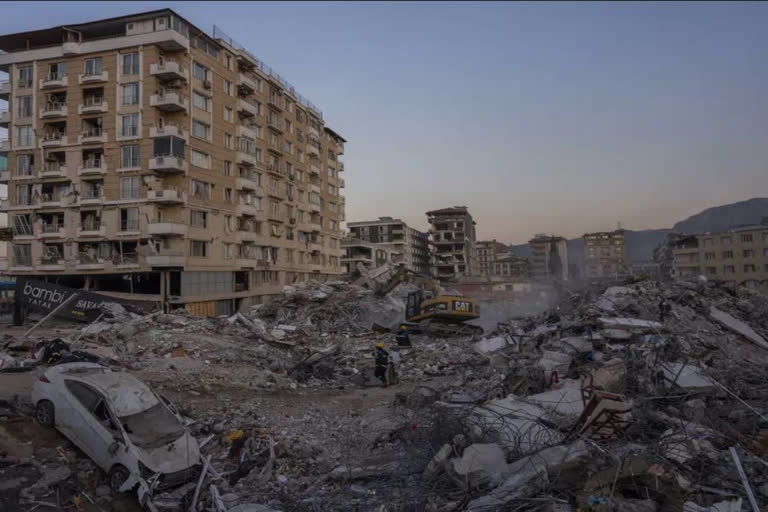Antakya : Turkish President Recep Tayyip Erdogan announced Tuesday that more than 35,000 people have died in Turkey as a result of last week's earthquake, making it the deadliest such disaster since the country's founding 100 years ago.
While the death toll is almost certain to rise even further, many of the tens of thousands of survivors left homeless were still struggling to meet basic needs, like finding shelter from the bitter cold. Confirmed deaths in Turkey passed those recorded from the massive Erzincan earthquake in 1939 that killed around 33,000 people.
Erdogan said 1,05,505 were injured as a result of the February 6 quake centered around Kahramanmaras and its aftershocks. Almost 3,700 deaths have been confirmed in neighbouring Syria, taking the combined toll in both countries to over 39,000. The Turkish president, who has referred to the quake as "the disaster of the century," said more than 13,000 people were still being treated in hospital.
Speaking in Ankara following a five-hour Cabinet meeting held at the headquarters of disaster agency AFAD, Erdogan said 47,000 buildings, which contained 2,11,000 residences, had been destroyed or were so badly damaged as to require demolition. "We will continue our work until we get our last citizen out of the destroyed buildings," Erdogan said of ongoing rescue efforts.
Aid agencies and governments were stepping up efforts to bring help to devastated parts of Turkey and Syria. The situation was particularly desperate in Syria, where a 12-year civil war has complicated relief efforts and meant days of wrangling over how to even move aid into the country, let alone distribute it. Some people there said they have received nothing. In Turkiye, meanwhile, families huddled in train cars.
The Syrian Health Ministry announced a final count of 1,414 deaths and 1,357 injuries in areas under government control. On Tuesday, the United Nations launched a USD 397 million appeal to provide "desperately needed, life-saving relief for nearly 5 million Syrians" for three months. It came a day after the global body announced a deal with Damascus to deliver U.N. aid through two more border crossings from Turkey to rebel-held areas of northwest Syria but the needs remained enormous.
Ahmed Ismail Suleiman set up a shelter of blankets outside his damaged house in the town of Jinderis, one of the worst-hit communities in northwest Syria. He was afraid to move his family back into a house that might not be structurally sound, so 18 people slept outside under the makeshift tent. "We sit but can't sleep lying down here," he said. "We are waiting for a proper tent."
Mahmoud Haffar, head of the town council, said residents have been able to scrounge up about 2,500 tents so far, but some 1,500 families still remain without shelter as nighttime temperatures fall to around minus 4 degrees Celsius (26 degrees Fahrenheit). "We are ... still hearing the question of when will aid get in," said Haffar.
While tents have been in short supply, one women said the town had a surplus of donated bread and water. To the southwest, in government-held Latakia, Raeefa Breemo said only those packing into shelters seemed to be getting aid. "We need to eat, we need to drink, we need to survive. Our jobs, our lives, everything have stopped," Breemo said.
Offers of help from rescue crews and doctors to generators and food have come from around the world, but the needs remain immense after the magnitude 7.8 quake and powerful aftershocks toppled or damaged tens of thousands of buildings, destroyed roads and closed airports for a time. The quake affected 10 provinces in Turkey that are home to some 13.5 million people, as well as a large area in northwest Syria that is home to millions.
Much of the water system in the quake-hit region was not working, and Turkey's health minister said samples from dozens of points of the system showed the water was unsuitable to drink. In the Turkish port city of Iskenderun, displaced families have sheltered in train carriages since last week.
While many have left in recent days for nearby camps or other parts of Turkey, dozens of people were still living in the trains on Tuesday.
"The wagons have become our home," 50-year-old Nida Karahan told Anadolu Agency. While a first Saudi aid plane, carrying 35 tons of food, landed in Syrian government-held Aleppo on Tuesday, getting aid to the country's rebel-held Idlib has been especially complicated.
Until Monday's deal between the U.N. and the Syrian government of President Bashar Assad, the global body had only been allowed to deliver aid to the area through a single border crossing with Turkey, or via government territory. The newly opened crossings at Bab al-Salam and Al Rae are to function for an initial period of three months. Russia bristled at suggestions that the opening of the crossings might be made permanent, and its Foreign Ministry accused the West of trying to get aid "exclusively" to areas not controlled by the Syrian government.
Major humanitarian organisations welcomed the development but cautioned that logistical problems remain, even as the first U.N. aid convoy with 11 trucks entered northwestern Syria through Bab al-Salam Tuesday. "This is a constant back and forth in negotiations," said World Health Organization spokesman Christian Lindmeier. "Every party has to agree to receive convoys." (AP)



